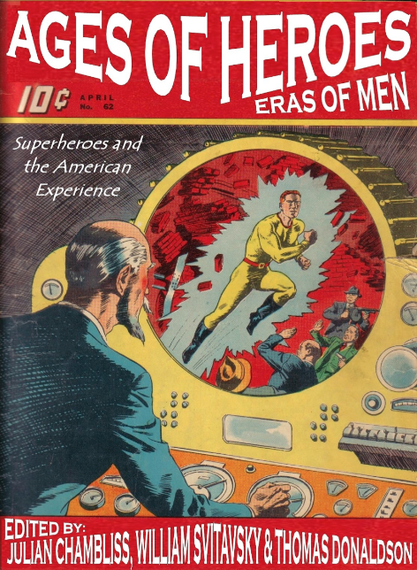Julian Chambliss is a professor at Rollins College and has edited a fun to read academic book on Superheroes called Age of Heroes, Eras of Men. I spoke to Chambliss about his book, now available in paperback.
What is Age of Heroes about?
Ages of Heroes, Eras of Men is a collection of essays about superhero comic books in the United States. The project use superheroes as a vehicle to investigate the evolution of U.S. society from the 1930s to the present day.
How is it different than other academic tomes on the subject?
Ages of Heroes brought together a diverse group of scholars to examine multiple characters in a historical framework. Most collections tend to be focus on single characters or a single theme. Our structure emphasizes how engagement with the superhero genre can be a powerful tool to study broad societal concerns through comic book narratives. When we began this process, there were limited opportunities for a reader to find multiple superhero characters examined from diverse theoretical frameworks rooted in an historical understanding in one volume. What Ages accomplished is to provide close analytical examinations and broad scope to examine superhero comics. We wanted this book to be accessible for researchers and students and that goal informed the chronological structure, characters chosen and themes investigated. With the book out in paperback, we are offering an instructor's guide with discussion questions and activities to help teachers use the book more effectively.
What drew you to comics?
Like a lot of people, I'm a fan. I've been reading comics since childhood. The "American" perspective on the urban experience represented by comic book cities and characters drive my focus on superhero comics. I see a link between comics and other documents that narrativize the city visually. Having studied and written about city planning history, I know the power of images to shape perceptions about the city. For me comics, especially superhero comics, are a byproduct of our collective narrative around urbanization. As a result, comic stories tend to be rooted in the creator's vision and audience's understanding of societal spaces. I'm teaching a new course in our (Rollins College) general education curriculum called "Creating the Comic Book City" where I talk a lot about thinking about comic book culture as a dialogue between the fictive universe in the panel and the cultural narrative the creators draw from to inform the reader's experience in the gutter (the space between the panels). In comics, these two spaces are always in dialogue. Plus, people have actually read Batman, Spider-Man, and Superman, so you can engage them around those characters.
Who are some of your favorite characters/titles?
I have always been an Iron Man fan. I was an Iron Man (and War Machine) fan before Robert Downey Junior made it cool (I appreciate his help). Beyond that, I'm a Marvel kid, so Spider-Man, Avengers, and X-Men titles have been in my pull for years. I'm also a big fan of Moon Knight, Black Panther, Iron Fist, Luke Cage and Fantastic Four. From DC, I've always been a fan of the Teen Titans, but I've picked up Jonah Hex, Batman, Justice League, Green Lantern, and Flash comics off and on for year. I also really enjoy Image, BOOM, Action Lab, and Dark Horse titles. Of course, broader comic narrative found in publishers like Humanoids, Top Shelf, Drawn and Quarterly, and NoBrow are always intriguing. We don't have space to talk about manga and anime, but I keep my eye on that as well.
What do comics tell us about ourselves?
Comics are reflection of the society's value, beliefs, and fears. Comics stand on equal terms with any media as a way to understand culture. Superhero comics are especially engaging because they have become a kind of parallel narrative intertwined with broad generational transformations in the United States. The concept was created in the 30s, evolved in the 60s and institutionalized in the 80s. Today, the medium is in dialogue with itself and the wider society. The result is superhero comics become a space to judge how some ideas change in the face of new expectations.
You can buy Age of Heroes here.


